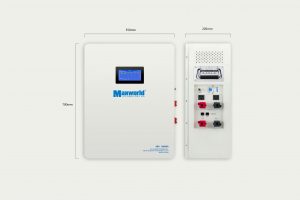Lithium vs. Lead Acid | what’s the Difference?

It is undeniable that lithium batteries represent the cutting edge of battery technology and are swiftly displacing conventional lead-acid, AGM, and gel batteries. But why? Lithium and lead differ in a variety of ways, therefore in order to help people better understand how they differ from one another, we’ve compiled a collection of information to show how they differ in particular ways.
Weight
The weight of the two is the first important difference to be made when contrasting lithium and lead. A 100ah lithium battery (328 x 172 x 220 mm), for example, weighs roughly 13 kg. The weight of a lead-acid battery of the same size is approximately 25 kg, hence lithium batteries weigh less than half as much.
Faster charging
Sometimes you need your battery to operate as quickly as possible. For example, let’s say you’re packing up your RV for a weekend excursion when you discover the battery is dead and requires eight hours to recharge. This issue is almost completely solved by lithium batteries, some of which may even be fully charged in an hour!
Longer lifespan
Compared to lead-acid batteries, lithium iron phosphate (LiFePO4) batteries offer 60% more useable capacity. Both lead acid and lithium batteries will stop operating power applications once a 12V battery dips to about 10.6V. A lead acid battery will use about 45–50% of its capacity before it reaches 10.6 volts, while a LiFePO4 battery will use about 97% of its capacity before it reaches that voltage. Due to this distinction, lithium batteries have a longer lifespan than lead-acid batteries—at least twice as long.
Cost
As an improved form of lead-acid batteries, lithium batteries are obviously more expensive. Consider the same two 100ah batteries from previously as an example. The lithium battery will likely cost at least five times as much as the lead acid battery. Some people will say it’s definitely worth it, while others will say it’s definitely not worth it. It all depends on which option is better for your application. This is great if you have a big lithium leisure battery that only powers your refrigerator, but this might be overkill. Would you like to be able to run your small refrigerator for twice as long using a battery that costs five times as much as you normally do? I doubt it. The time might be right to explore lithium batteries, though, if your lead-acid leisure battery is being taxed to the breaking point by running several apps at once.
Environmental safety
Although lead-acid battery manufacturing has gradually moved toward being environmentally friendly, inappropriate usage or recycling of these batteries can still easily contaminate the environment. Recycling is also fairly developed and is taken into consideration during the manufacture of lithium batteries.
Safety
Lithium batteries from Safety Power have varying levels of safety performance depending on their composition. The safety performance of lead-acid batteries is higher than that of lithium batteries because the technology has reached a highly advanced stage. In general, lead-acid batteries are less expensive, have better discharge performance, but have limited service lives and are more likely to pollute. Lithium batteries, on the other hand, have great energy efficiency and environmental protection.
Volume
Lithium batteries have a smaller volume than lead-acid batteries and are therefore easier to ride or move.
Product excellence
There isn’t much of a difference between the quality of battery goods made by the same manufacturer with the same specs from a product standpoint. Customers are free to make decisions based on their individual needs. When making a purchase, it is advised that you go with a well-known brand, such Maxworld battery manufacturer. With 22 years of battery manufacturing expertise, Maxwold Power Battery has relatively established battery manufacturing technology. By sticking with a well-known brand, you may avoid putting your financial and personal security at peril by purchasing subpar goods.
All in all, there are differences between lead-acid and lithium batteries in terms of battery life, market price, cruising range, volume, quality, and mileage. Here is a brief comparison of lead acid vs lithium batteries in the hopes that it will aid you in any battery selections you need to make.






